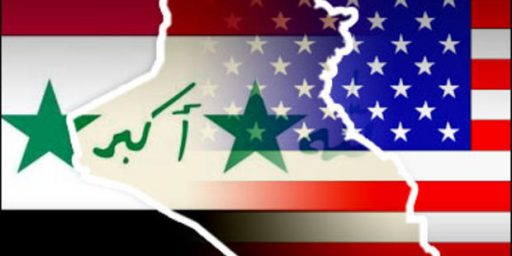Al Qaeda Attacks U.S. Base in Ramadi
Al Qaeda guerrillas attacked a U.S. base in Ramadi this morning and have control of some of the city’s streets.
Iraqi rebels attack in Ramadi, seize some streets (Reuters)
Masked militants attacked a U.S. base and a local government building with mortars and rockets in the western Iraqi city of Ramadi on Thursday, before holding ground on central streets, residents said. Scores of heavily armed men set up roadblocks at major entrance and exit points to the city, a heartland of the insurgency in Iraq, and patrolled the main thoroughfares, residents said. In some areas they dispersed after a few hours, but guerrillas remained in other parts.
Leaflets were distributed and posted on walls, saying al Qaeda in Iraq, the group led by Jordanian militant Abu Musab al-Zarqawi, was taking over the city. “Its followers will burn the Americans and will drive them back to their homes by force. Iraq will be a graveyard for the Americans and its allies,” one of the leaflets read.
This is their first bold action against U.S. forces in quite some time. Presumably, this is an attempt to reclaim the mantle of rebels fighting against an occupying force vice their recent role of killing innocents and officials of a democratically elected indigenous government.
Ramadi is an especially shrewd target because quite a bit of good news has been flowing from there in recent days. For example,
Ramadi offensive nets suspected insurgents (CNN, Nov. 27 )
U.S. and Iraqi troops have detained several suspected insurgents in the Ramadi area as part of the latest joint operation in the area dominated by Sunni Arabs, the U.S. Marines said Sunday. Imad Salih al-Fahdawi, who has been linked to an al Qaeda in Iraq cell, was one of the insurgents detained, the Marines said in a news release. “Salih was involved in attacks against government officials and imams,” the release said.
The raids, involving 400 coalition personnel and 150 Iraqi soldiers, also turned up several weapons caches in the eastern part of Anbar province’s capital, it added. “The caches found consisted of numerous artillery and mortar rounds, rocket-propelled grenades, high explosives, small arms weapons, small arms ammunition, bulletproof vests and bomb-making equipment,” according to the Marines’ statement.
Coalition troops making real progress in Ar Ramadi (Spectrum, Nov. 30)
Both U.S. Marines and Army troops are working in the Ar Ramadi area, alongside steadily increasing numbers of Iraqi soldiers and security forces. It’s also clear from military statements that coalition forces have accelerated the “ops-tempo” around Ramadi in the last couple of months, mounting a series of local operations to destroy the insurgent network and clean out the toughest sections of the city. Operation Mountaineers in October, then Operations Panther, Bruins and Bowie, and now Operation Tigers, have essentially merged into a continuous push.
If you listen to what the troops say, the results have been tangible. Each operation has netted terrorist/insurgent leaders, destroyed significant caches of enemy weapons and explosives, and made the neighborhoods more secure. And now that Iraqi troops are patrolling alongside the Americans, the positive results are more persistent. In addition, coalition civil affairs units have had key successes restoring telephone and Internet service to the city (the insurgents had cut the lines), and re-opening a glass factory that was one of Ramadi’s major employers and is now again providing 2,300 jobs.
And even in hard-line Sunni strongholds, there are regular Iraqis who appreciate the troops. Marine Sgt. Ryan Haney patrols neighborhoods near Camp Blue Diamond. “When we first started patrolling people were put off by us,” Haney says, “but within a few weeks things had changed. We go into their homes, we know their names and their children’s names, and they know ours.” U.S. Army soldiers working in Ar-Ramadi – possibly some of our friends and family in the 222nd – are probably having the same kinds of experiences and seeing the same kinds of results.
This street-level familiarity has concrete benefits. “The terrorists that come here to fight sometimes come from hundreds of miles away. We can tell if they are outsiders by their body language,” Haney says. He also says that the troops often get tips from locals. “They trust us because they know we’re here to help them. They give us valuable (information) so we can detain these guys. We’re here to help them help themselves. We’re doing our small part here … but when you put all the little parts together, we’re getting it done.”
We’ll soon see if that assessment is accurate.






Soldiers in Ramadi report an attack of one RPG which missed, injuring no one. Seems al-Qaeda in Iraq has learned from the US media. Just because it is in the news does not make it necessarily so.
The story released by AP about the insurgents in Ramadi is not true. The Marines over there have been trying to squash that story all day. It was based on rumours from insurgents.
Here is the true story, given to me by the Marine Captain who told the AP their story was false:
False Rumours Circulating About Widespread Attacks in Ramadi
http://newsblaze.com/story/20051201065832nnnn.nb/newsblaze/TOPSTORY/Top-Story.html